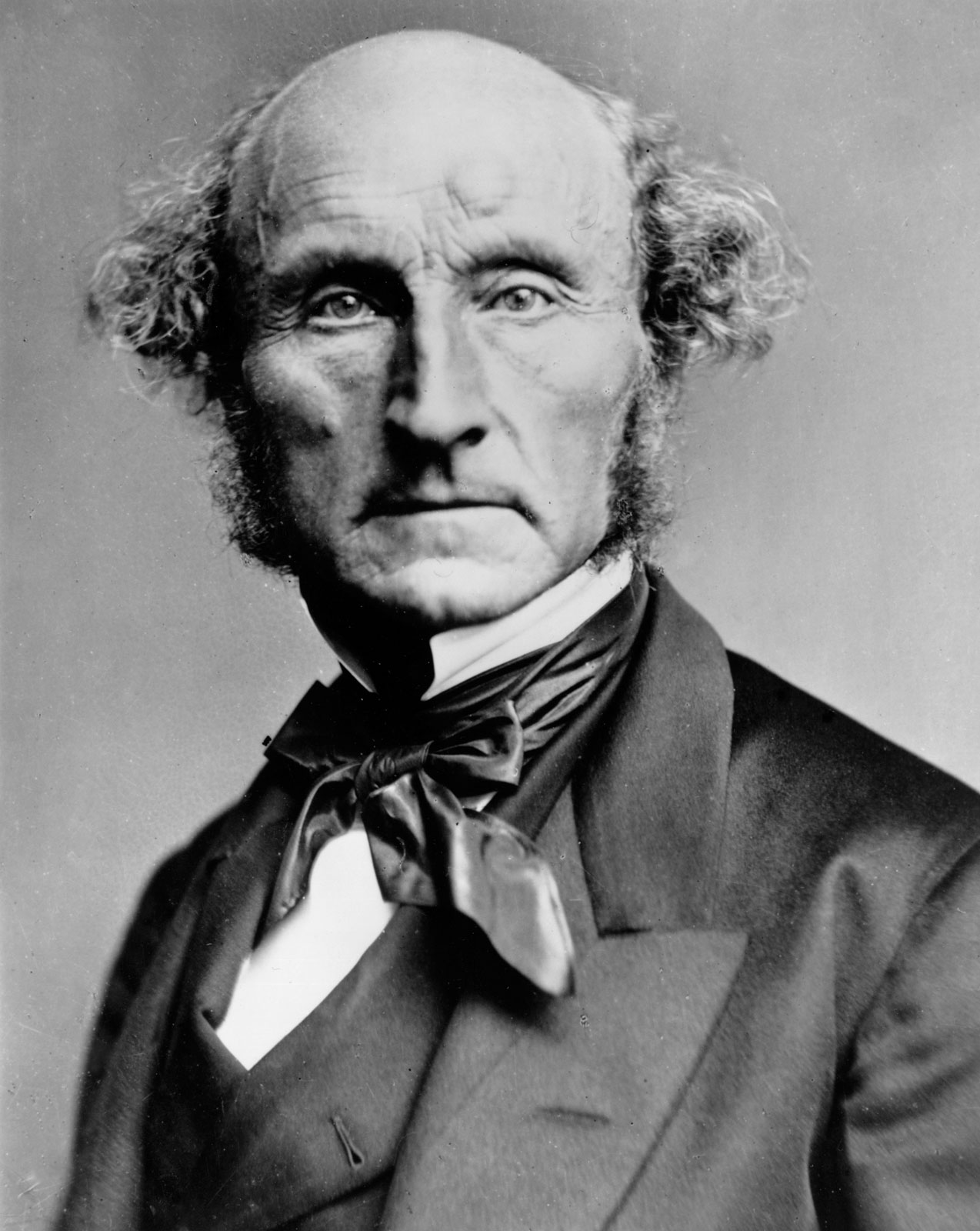John Stuart Mill Berühmte Zitate
Utilitarismus
(Original engl.: "It is better to be a human being dissatisfied than a pig satisfied; better to be Socrates dissatisfied than a fool satisfied. And if the fool, or the pig, are of a different opinion, it is because they only know their own side of the question. The other party to the comparison knows both sides.) - Utilitarianism, 1863, Chapter 2. gutenberg.org http://www.gutenberg.org/etext/11224
Grundsätze der politischen Oekonomie
System der deduktiven und induktiven Logik, Siebenzehntes Capitel. Vom Zufall und seiner Elimination, zeno.org http://www.zeno.org/nid/20009227016
"If the same casual coincidence never occurred a second time, we should have an easy test for distinguishing such from the coincidences which are results of a law." - John Stuart Mill, The Collected Works of John Stuart Mill, Volume VII - A System of Logic Ratiocinative and Inductive, Being a Connected View of the Principles of Evidence and the Methods of Scientific Investigation (Books I-III), ed. John M. Robson, Introduction by R.F. McRae (Toronto: University of Toronto Press, London: Routledge and Kegan Paul, 1974). 18.2.2017. http://oll.libertyfund.org/titles/246#lf0223-07_footnote_nt_2719_ref
John Stuart Mill Zitate und Sprüche
Über die Freiheit
Rektoratsrede an der Universität St. Andrews 1867. Deutsch von :w:Adolf Wahrmund. In: Gesammelte Werke Erster Band. Leipzig 1869. S. 206 books.google https://books.google.de/books?id=OShCAAAAcAAJ&pg=PA206
Original engl: "Universities are not intended to teach the knowledge required to fit men for some special mode of gaining their livelihood. Their object is not to make skilful lawyers, or physicians, or engineers, but capable and cultivated human beings." - https://en.wikisource.org/wiki/Inaugural_address_delivered_to_the_University_of_St._Andrews,_Feb._1st_1867
In einer Parlamentsdebatte mit dem dem Konservativen John Pakington MP vom 31. Mai 1866
Hansard, vol 183 http://hansard.millbanksystems.com/commons/1866/may/31/committee-adjourned-debate#S3V0183P0_18660531_HOC_32, col 1592
Original engl.: I did not mean that Conservatives are generally stupid; I meant, that stupid persons are generally Conservative. I believe that to be so obvious and undeniable a fact that I hardly think any hon. Gentleman will question it.
John Stuart Mill: Zitate auf Englisch
Quelle: Autobiography (1873)
Quelle: https://archive.org/details/autobiography01mill/page/77/mode/1up pp. 77-78
Quelle: https://archive.org/details/autobiography01mill/page/50/mode/1up pp. 50-51
Quelle: https://archive.org/details/autobiography01mill/page/49/mode/1up pp. 49-50
Quelle: Autobiography (1873)
Quelle: https://archive.org/details/autobiography01mill/page/48/mode/1up p. 48
Quelle: Autobiography (1873)
Quelle: https://archive.org/details/autobiography01mill/page/46/mode/1up p. 46
Quelle: Autobiography (1873)
https://archive.org/details/autobiography01mill/page/41/mode/1up pp. 41–42
Quelle: Autobiography (1873)
https://archive.org/details/autobiography01mill/page/36/mode/1up pp. 36–37
Quelle: Autobiography (1873)
https://archive.org/details/autobiography01mill/page/33/mode/1up pp. 33–34
Quelle: Autobiography (1873)
https://archive.org/details/autobiography01mill/page/30/mode/1up pp. 30–31
"Civilization," London and Westminster Review (April 1836)
Quelle: Autobiography (1873)
https://archive.org/details/autobiography01mill/page/40/mode/1up p. 40
Quelle: Autobiography (1873)
https://archive.org/details/autobiography01mill/page/34/mode/1up p. 34
Quelle: Autobiography (1873)
https://archive.org/details/autobiography01mill/page/30/mode/1up p. 30
cannot be answered, because we have no experience or authentic information from which to answer it; and that any answer only throws the difficulty a step further back, since the question immediately presents itself, “Who made God?”
Quelle: Autobiography (1873), Ch. 2: Moral Influences in Early Youth. My Father's Character and Opinions.
'Long before I had enlarged in any considerable degree, the basis of my intellectual creed, I had obtained in the natural course of my mental progress, poetic culture of the most valuable kind, by means of reverential admiration for the lives and characters of heroic persons; especially the heroes of philosophy.'
Autobiography (1873)
That a thing is unnatural, in any precise meaning which can be attached to the word, is no argument for its being blamable; since the most criminal actions are to a being like man not more unnatural than most of the virtues.
Quelle: On Nature (1874), p. 102
Quelle: Autobiography (1873)
Quelle: https://archive.org/details/autobiography01mill/page/233/mode/1up pp. 233-234
pages 176-177; Early Modern Texts page 16
Three Essays on Religion (posthumous publication), Theism, Part II: Attributes
“landlords... grow richer, as it were in their sleep, without working, risking, or economizing."”
Book 5, Chapter 2, Section 5
Principles of Political Economy (1848-1871)
“I generally answered to myself, that I did not think I could possibly bear it beyond a year.”
Autobiography (1873)
Book V, Chapter 11, Section 9
Principles of Political Economy (1848-1871)
Autobiography (1873)
Kontext: What we principally thought of, was to alter people's opinions; to make them believe according to evidence, and know what was their real interest, which when they once knew, they would, we thought, by the instrument of opinion, enforce a regard to it upon one another. While fully recognizing the superior excellence of unselfish benevolence and love of justice, we did not expect the regeneration of mankind from any direct action on those sentiments, but from the effect of educated intellect, enlightening the selfish feelings.
